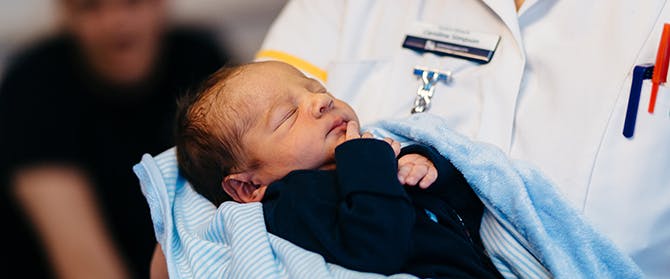Employability
Your ambition is to train as a midwife but are you in the know about the many career options that will be available to you once your course is successfully complete?
Take a look and find out more about where a BSc (Hons) Midwifery degree could take you, and remember, this is just a taste of the type of work you could get involved in...

Working for the Armed Forces or charities including the Red Cross, Medecins Sans Frontieres (MSF)
Wherever there are people, babies will be born and midwives will be needed. This includes military camps and areas of the world in the midst of man-made or natural disasters. You may work in a military hospital, or health centres and conduct outreach work in the community.
Domestic abuse
For many women pregnancy is a time of happiness and anticipation. But pregnancy can also be a risk factor for domestic violence. As a midwife you can expect to encounter incidents of domestic violence. The charity Refuge states that over a third of domestic violence starts or gets worse when a woman is pregnant, one midwife in five knows that at least one of her expectant mothers is a victim of domestic violence and a further one in five midwives sees at least one woman a week who she suspects is a victim of domestic violence. Domestic violence during pregnancy increases the risk of miscarriage, infection, premature birth, low birth weight, fetal injury and fetal death.
Expectant mothers using drugs and/or alcohol
In some areas there are specialist midwives who provide care for women with issues around drugs and/or alcohol. Specialist knowledge allows these midwives to provide vulnerable women with the continuity of care, time, empathy and compassion they need as well as reducing maternal and fetal morbidity and mortality.
Community midwife
As a midwife in the community you will often work in teams and provide a degree of continuity of care. You will see service users either at their home or at a clinic, and you will be available for home births when women go into labour or in hospital if it's necessary for the woman to come into hospital. You'll visit new mothers at home for up to ten days after their baby is born. Community midwives also provide postnatal care for women who have been looked after during labour by hospital midwives.
Pre- and post-natal mental health
Specialist Mental Health Midwives are expert midwives and local champions who lead work with maternity service commissioners and providers to ensure that women with perinatal mental illnesses and their families receive the specialist care and support they need during pregnancy and in the postnatal period. They support their maternity team colleagues to ensure that services deliver the best possible personalised care to these women and their families to optimise their mental health.
Hospital setting
Hospital midwives are based in a hospital obstetric, or consultant unit, a birth centre or midwife-led unit, and they staff the antenatal clinic, labour ward, and postnatal wards.
Obstetric emergencies
Pregnancy can sometimes present life-threatening health problems for a mother and her baby. These problems are called obstetric emergencies. In these cases, extra care is needed. A woman may need a lot of tests and treatments, and extended hospital stays. She may also face a premature birth or the loss of her baby. Whatever the reason for serious complications during pregnancy, they can cause frustration, distress and sometimes grief. Obstetric emergencies include miscarriage, ectopic pregnancy, pre-eclampsia and eclampsia, placental abruption, placenta previa and premature rupture of membranes (PROM).
Sonography/Ultrasound scanning
A midwife sonographer is a member of a multi-disciplinary team who performs obstetric and gynaecology ultrasound scans and provides diagnostic reports. Duties are likely to include first trimester ultrasound screening, early pregnancy ultrasound, obstetric ultrasound dating for family planning, third trimester fetal surveillance and trans-vaginal ultrasound for infertility. Of course, you will also be responsible for counselling women undertaking diagnostic testing and communicating with them the outcomes.
Neo-natal nursing
Qualified, registered adult and child nurses as well as midwives are eligible to apply to neo-natal nursing roles. Neo-natal nurses look after poorly, often premature, babies from birth to four weeks old carrying out tasks such as preparing and checking medications, managing a baby’s fluids, recording observations and documenting a baby’s care and initiating appropriate basic resuscitation in an emergency situation. You will also support parents of the baby at this stressful time.
Health visiting
Health visitors are qualified nurses or midwifes with post-registration experience who have undertaken further training and qualifications in child health, health promotion, public health and education. You work as part of a primary healthcare team, assessing the health needs of individuals, families and the wider community. Working in a community setting, you will often visiting people in their own homes to support new parents and pre-school age children.
Teenage mothers
Midwives who specialise in teenage pregnancy provide specialist midwifery knowledge and skills to support the development of multi-agency and multidisciplinary pathways of care to fulfil the holistic needs of pregnant teenagers and young parents across care settings. As a midwife in this area you may also lead and contribute to regular audit and research activities into the experiences of teenage mothers and service providers that will help shape the future of care delivery to this often vulnerable and excluded group.